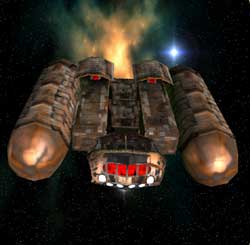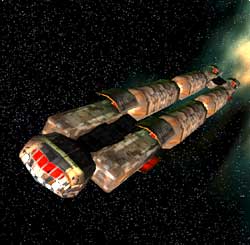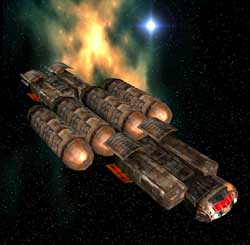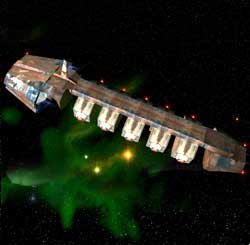FREIGHTERS
 |
Manufacturer: NSO Laplace
Length: 690m
Mass: 828,000t
Crew: 30 + 3
Maneuverability: Low
Offensive Systems:
1 x PBC
Defensive Systems:
2 x LDA ( Upper and Lower )
2 x Countermeasure Launchers
Drive Systems:
Standard Thrust Array
LDS Class 1
Capsule Drive
Originally designed as a troop ship for the Commonwealth Navy, the versatility of the Jeep design has led it to be used for a variety of roles never even envisaged by the original designers. Jeeps are still used for military purposes, but they have also found a role as hospital ships, civilian passenger transports and light cargo ships. As part of their military heritage they are still armed with a single PBC and are well shielded and armored.
 |
Manufacturer: NSO Laplace
Length: 540m
Mass: 151,200t ( Unladen )
Crew: 20 + 4
Maneuverability: Low
Offensive Systems:
None
Defensive Systems:
2 x LDA ( Upper and Lower )
Drive Systems:
Standard Thrust Array
LDS Class 1
Capsule Drive
The Oakland class, like its close relative the Tir class, is now nearing the end of its service life and will soon no longer be manufactured. Designed originally as a refined neutronium ore carrier it has been superceded by more modern types of freighters (such as the City class light freighter) that require fewer crew and lower operating costs.
 |
Manufacturer: NSO Laplace
Length: 2.35km
Mass: 4,700,000t ( Unladen )
Crew: 8 + 4 + 4
Maneuverability: Very Low
Offensive Systems:
None
Defensive Systems:
None
Drive Systems:
Heavy Thrust Array
LDS Class 1
Capsule Drive
The Powell class Megatransporter (sometimes known as a ‘Megafreighter’) is the largest civilian ship in service today, excepting Low Orbit Recovery Platforms which are not generally classed as ships. Standard Megatransporters carry a compliment of up to 30 giant ‘Megapods’ (themselves equivalent to nearly 35 standard cargo pods). They are most commonly used to ferry bulk cargo (including station components) between the Badlands and Gagarin clusters. On the grounds that it lacks any defensive systems (making it a particularly large and vulnerable target) the Megatransporter is normally escorted by patcom or corvette class ships. As might be expected its operating costs are huge limiting its use to corporations and system governments. A ferry variant is available which replaces the Megapod docking ports with standard docking connections. This allows the transport of up to 30 ships at any one time.
 |
Manufacturer: Maas Corporation
Length: 155m
Mass: 446,500t ( Unladen )
Crew: 6 + 2
Maneuverability: Low
Offensive Systems:
None
Defensive Systems:
None
Drive Systems:
Heavy Thrust Array
LDS Class 1
Capsule Drive
The MS-FR70 fuel transporter’s modular design makes it an easy ship to maintain. It is commonly used to transfer fuel products between stations, but variants include those converted to carry liquid foodstuffs, liquefied gases such as oxygen, and liquid waste products. It is a close relative of the MS-FR80 and MS-FR90 transporters, which are constructed from the same basic core components.
 |
Manufacturer: Maas Corporation
Length: 375m
Mass: 70,010t (Unladen)
Crew: 8 + 2
Maneuverability: Low
Offensive Systems:
None
Defensive Systems:
None
Drive Systems:
Standard Thrust Array
LDS Class 1
Capsule Drive
The MS-FR80 fuel transporter’s modular design makes it an easy ship to maintain. It is commonly used to transfer fuel products between stations, but variants include those converted to carry liquid foodstuffs, liquefied gases such as oxygen, and liquid waste products. It is a close relative of the MS-FR70 and MS-FR90 transporters, which are constructed from the same basic core components.
 |
Manufacturer: Maas Corporation
Length: 520m
Mass: 80,200t (Unladen)
Crew: 10 + 2
Maneuverability: Low
Offensive Systems:
None
Defensive Systems:
None
Drive Systems:
Standard Thrust Array
LDS Class 1
Capsule Drive
The MS-FR90 fuel transporter’s modular design makes it an easy ship to maintain. It is commonly used to transfer fuel products between stations, but variants include those converted to carry liquid foodstuffs, liquefied gases such as oxygen, and liquid waste products. It is a close relative of the smaller MS-FR70 and MS-FR90 transporters, which are constructed from the same basic core components.
 |
Manufacturer: Maas Corporation
Length: 370m
Mass: 83,250 (Unladen)
Crew: 5 + 2
Maneuverability: Low
Offensive Systems:
None
Defensive Systems:
None
Drive Systems:
Heavy Thrust Array
LDS Class 1
Capsule Drive
The City class light freighter has replaced the older Oakland class as the freighter of choice for medium sized shipping companies. Its low crew requirements and relatively large 10 pod cargo capacity, make it an obvious choice. Like the Venice class, it lacks any form of offensive or defensive systems, but it is not considered cost effective to retrofit them as the spaceframe is not suitable.
 |
Manufacturer: Maas Corporation
Length: 490m
Mass: 264,600t (Unladen)
Crew: 10 + 3
Maneuverability: Low
Offensive Systems:
None
Defensive Systems:
None
Drive Systems:
Heavy Thrust Array
LDS Class 1
Capsule Drive
The Venice class heavy freighter has the largest carrying capacity of any equivalent sized ship. Capable of carrying up to 20 standard cargo pods, it is a highly cost-effective ship to operate, and as such is extremely popular with shipping companies. The lack of defensive shields has reduced its manufacture cost, but has left it vulnerable to attack. Consequently some companies are retrofitting their Venice class freighters with shields and other defensive systems, and Maas Corporation is considering offering these systems prefitted as an option to prospective buyers.